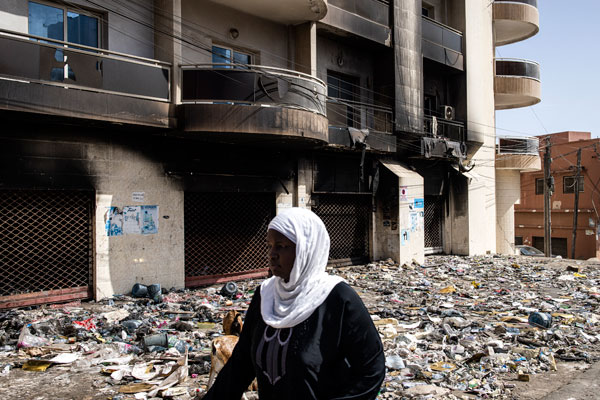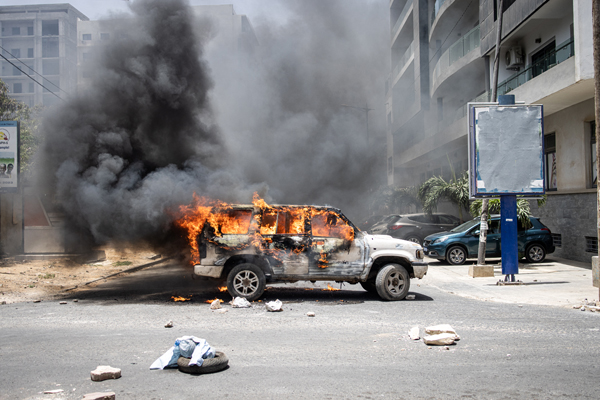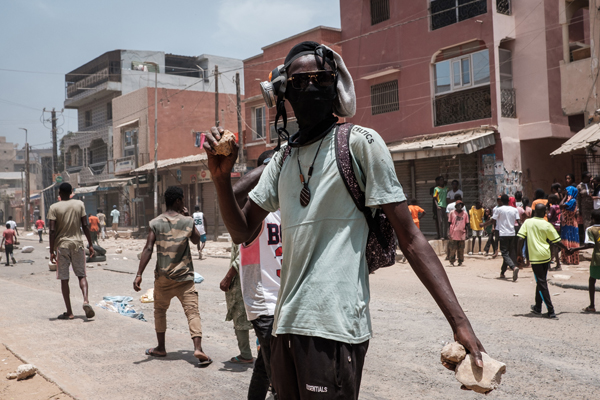Prime
Fallout from Senegal unrest hits economy

A woman walks past a burned out and ransacked supermarket in the popular Yoff Neighbourhood of Dakar, on June 5, 2023, as protest calmed down four days after a court in Senegal sentenced opposition leader Ousmane Sonko, a candidate in the 2024 presidential election, to two years in prison on charges of "corrupting youth" but acquitted him of rape and issuing death threats. PHOTO/ AFP
As Senegalese struggle with the aftermath of deadly protests sparked by the conviction of an opposition leader, attention is shifting to the impact on the nation's economy.
Two days of violence last week have cost "billions of CFA francs" -- tens of millions of dollars -- and political risk is threatening this year's growth targets, said consultant economist Mansour Sambe.
The West African state has long surfed on its reputation for stability in a region plagued by coups.
But that cosy image has been dented by clashes between the security forces and supporters of firebrand presidential candidate Ousmane Sonko.
Sixteen people died and hundreds were injured or arrested after Sonko on Thursday was sentenced to two years on charges of "corrupting" a young woman.
That verdict was the outcome of a two-year case for rape charges that transfixed the country, triggering sporadic unrest that had already claimed a dozen lives.
In a country that has only a meagre social safety net, many Senegalese live in precarity and eye disruption with dread.
'If you work, you eat'
Magaye Gaye, a 19-year-old toiletries seller at the Sandaga market in Dakar, said he had closed his stall on the eve of the trial's outcome.
Several days without business had left him with almost nothing.
"I have spent all my savings just to survive," he told AFP.
Clothing seller Modou Gueye, 46, was in a similar predicament.
"Clients have stayed away because they are afraid," he said Monday. "We live from one day to the next. If you have work, you eat, if you have no work, you go hungry."
For many poor Senegalese, the coming Muslim festival of Tabaski is a daunting moment, as it requires the purchase of lamb for the traditional family feast.
Some have been badly hit by the government move at the weekend to suspend mobile internet access after it blocked access to social media, since millions use mobile phones to transfer money.
"The banks have been closed since Wednesday," Ady Thiam, a 45-year-old accountant, said while waiting in line on Monday.
"You can't get your wages or your pension. Daily workers aren't being paid. People can't get medical treatment," he said.
"People have so little anyway -- this is what causes them to revolt."
'Political risks'
Further tension seems almost inevitable.
The next flashpoint could be when Sonko -- believed to be at his home in Dakar, surrounded by police -- is taken into custody to serve his sentence.
Then there are the potentially stormy waters of next year's presidential elections, for which Sonko now appears to be ineligible.
"The biggest danger for investors are political risks," Sambe said.
Before the unrest, economists had been expecting growth of nine to 10 percent for 2023, he said.
But with uncertainty hanging over the 2024 election, "the entire second half (of 2023) could be lost", he said.
Sambe urged President Macky Sall to intervene, saying, "He has to reassure the public".
Spotlight on Sall
But Sall's own credibility is on the line.
Sonko's supporters say their champion, like other Sall rivals before him, is being persecuted by a manipulated judicial system -- a charge the president denies.
But Sall himself has stoked uncertainty, refusing to say clearly whether he will bid for a third presidential term, a move critics say would breach the constitution.
Of all the crises that modern Senegal has faced, the present one "is the easiest to resolve," three leading intellectuals said in an open letter on Monday.
"All it would need is for one man to say, 'I am not going to seek a third term, which would dishonour my word, my country and its constitution'."
The letter was penned by award-winning writers Mohamed Mbougar Sarr and Boubacar Boris Diop, and Felwine Sarr, who co-wrote a landmark report on the restitution of African cultural artefacts.
Sall on Monday paid a surprise late-night visit to Serigne Bassirou Mountakha Mbacke, the spiritual leader of an influential Muslim fraternity, the daily Soleil reported on Tuesday.
"The wisdom of his advice in some situations can help restore peace and stability," it said.
Meanwhile, Dakar announced it was closing several foreign consulates -- notably in Paris, Bordeaux, Milan and New York -- which have come under attack amid the unrest.





